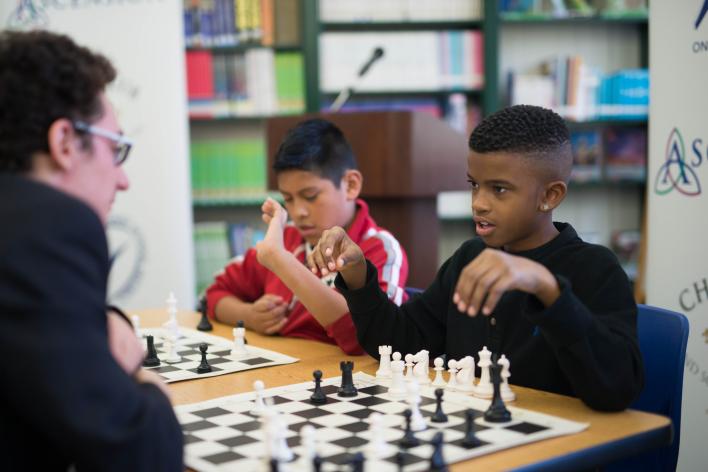
by Matthew Pepper & Emily Sholtis, Basis Policy Research
One of the primary goals of the Chess Club and Scholastic Center of Saint Louis is to encourage and support chess in schools. This provides opportunities to introduce chess to students with disabilities, including autism. While chess competition can certainly be intense, its quiet, cerebral environment has led to some to speculate that chess could be a good fit for students with autism, who might struggle in other competitive opportunities. At the 2014 London Chess Conference (where a meta-analysis on chess and academics funded by the CCSCSL was presented) a Dutch psychologist named Karel van Delft shared a conceptual overview of the connections between autism and chess as well as educational tips for those teaching chess to children on the spectrum.
An extensive review of the literature, however, fails to find peer-reviewed research that investigates the propensity of individuals with autism to participate in chess. There is also a lack of rigorous studies examining potential connections between chess and the needs of students with autism. There are a number of peer reviewed studies on students with autism and games, but these studies focus on the use of games as a tool for facilitating socialization (and, due to their small sample sizes, lack generalizability).
Nonetheless, anecdotes about links between characteristics of autism and the culture of chess exist in the blogosphere (see here and here). Recently, in Saint Louis, a local TV affiliate presented a story on a student with autism excelling as the captain of his school’s chess team. These anecdotes are not a substitute for a well-designed research study, but may be indicative of an area ripe for research.
In reviewing the research literature on autism as well as foundational instructional and developmental literature, we propose the following as areas of interest for researchers:
A) Chess & Socialization - Does chess facilitate increased socialization among children with autism, either through merely increased interactions with other students and/or through teamwork and other game-related interactions?
B) Chess and Strategic Thinking – Does chess develop strategic thinking among children with autism?
C) Individuals with autism and Chess – Are characteristics of autism or the extent of the syndrome associated with a proclivity towards chess?
D) Chess and Personal Benefits – Is playing chess associated with non-cognitive benefits among students with autism, such as increased self-esteem, persistence, and/or self-control?
E) Chess and Empathy – Does playing chess, which requires one to see your opponent’s perspective, a skill that may builds the skill of empathy among students with autism?
These are just a few ideas for innovative research that could be done in the relatively untouched field of autism and chess. We’ll continue to track #ChessResearch on autism and more. Come back here soon for our next update!


